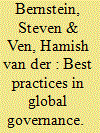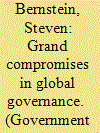|
|
|
Sort Order |
|
|
|
Items / Page
|
|
|
|
|
|
|
| Srl | Item |
| 1 |
ID:
153261


|
|
|
|
|
| Summary/Abstract |
Best practices are increasingly used to govern a range of global issues. Yet, the rise of global governance through best practices has received scant attention in the International Relations literature. How do best practices differ from other modes of governance? How are they constructed? And to what end? We offer a novel conceptualisation of best practices as a unique mode of global governance principally distinguished by basing claims of political authority on existing practices. Belying their apolitical terminology, best practices in global governance are purposively constructed by political actors to steer targeted actors toward desired ends. We illustrate the characteristics of governance through best practices with reference to state and non-state global governance initiatives in a wide range of issue areas, ranging from finance and development to human rights and the environment, and through an in-depth case study of the ISEAL Alliance, a disseminator of best practices for transnational sustainability standard-setters. We find that governance through best practices has both positive and negative consequences. While it offers a pragmatic approach to global governance under conditions of fragmentation and polycentricity, it can also mask underlying power dynamics and political agendas and therefore requires ongoing critical scrutiny.
|
|
|
|
|
|
|
|
|
|
|
|
|
|
|
|
| 2 |
ID:
112806


|
|
|
|
|
| Publication |
2012.
|
| Summary/Abstract |
Standard works on international environmental governance assume single-issue regimes with binding obligations designed to govern the behaviour of states. Yet many of the most pressing global environmental problems, including climate change, forest degradation and biodiversity loss, are governed by an array of mechanisms-legal, non-legal, governmental and non-governmental-in complex arrangements. Examining the combined effects of these international and transnational efforts on domestic or firm policies and practices-the usual targets of such efforts-requires expanding a focus on regime 'compliance' and 'effectiveness' to 'influence' factors from beyond state borders. To facilitate such a move, the authors develop a framework that distinguishes four distinct pathways through which actors and institutions influence domestic policies: international rules; international norms and discourse; creation of, or interventions in, markets; and direct access to domestic policy processes. Propositions are then developed on the conditions under which, and processes through which, actors and institutions affect domestic and firm policies and practices along each pathway. The framework is applied to the case of forest governance, a prototypical example of complex global environmental governance.
|
|
|
|
|
|
|
|
|
|
|
|
|
|
|
|
| 3 |
ID:
114809


|
|
|
|
|
| Publication |
2012.
|
| Summary/Abstract |
Two attempts at grand compromise have underpinned global order since the end of the Second World War. The first, a compromise between laissez-faire liberalism and domestic interventionism, famously described by John Ruggie as 'embedded liberalism', legitimated and stabilized a multilateral order for 50 years. A second attempt, this time between North and South at the end of the Cold War around a discourse of 'sustainable development', remains uneasy, conflict prone and much less institutionalized. They are compared and contrasted by asking whether they are truly compromises or reflect domination and hegemony, what conditions led to them, and what drivers of change have limited and challenged them. Ultimately, differences in their bases of legitimacy offer lessons for the prospects of building a new grand compromise in the wake of contemporary strains on global governance.
|
|
|
|
|
|
|
|
|
|
|
|
|
|
|
|
|
|
|
|
|